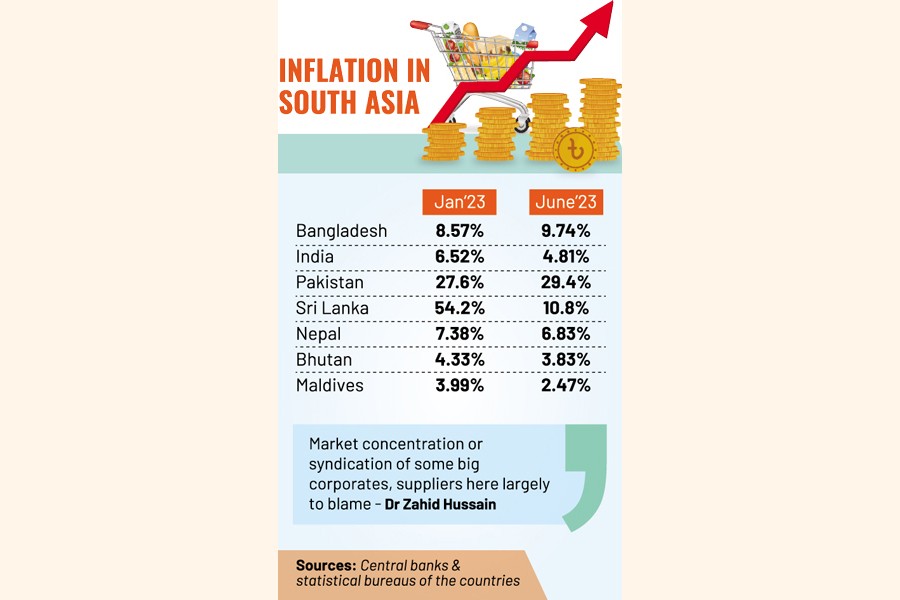Inflation in BD stubbornly high despite fall in S Asia
Neighbours see significant CPI fall, few from astronomical highs

Published :
Updated :

Bangladesh still sees consumer-price index (CPI) still indomitably high, pushed by price rises, despite significant fall in inflation in South Asian nations and worldwide, analysts said Wednesday.
Global price fall of different commodities has hardly had impact on the inflation in Bangladesh, they noted, as latest statistics show the CPI hurtling down from astronomical highs in few neighbours-Sri Lanka in particular.
Economists and analysts say "failure" in demand-supply management from the fiscal and monetary perspectives, smooth product-supply mechanism, and "dishonesty" on part of some businessmen, extortion on roads and markets are to blame for higher CPI trend in Bangladesh.
An FE analysis has found that the inflation in troubled Sri Lanka and Pakistan have dropped drastically while India, the Maldives, Nepal and Bhutan also have seen significant fall.
Contrarily, the month-on-month inflation in Bangladesh has maintained a higher trend in the current calendar year 2023 since the starting month of January.
The point-to-point inflation in Bangladesh was recorded at 9.74 per cent in June on a track of market volatility over six months.
In January last, the country's inflation rate was 8.57 per cent, Bangladesh Bureau of Statistics (BBS) data showed.
The rate of inflation in the crisis-induced impoverished Sri Lanka has hurtled down from an astronomical high of 53.2 per cent in January to stand at 10.8 per cent last month, statistics available with the central bank Lanka showed.
Similarly, the rate in Pakistan also dropped to 24.4 per cent in June from a peak 38 per cent in May this year, the Pakistan central bank's statistics showed.
The Sri Lankan government claimed the key inflation rate there eased for the ninth consecutive month to 10.8 per cent in June as food inflation declined for the first time since 2019 to 1.4 per cent against 4.1 per cent in June.
Inflation also decelerated for non-food items to 10.5 per cent against 16.2 per cent in June.
India's rate stood lowest at 4.42 per cent in July in a decrease from 6.16 per cent in January, the official data showed, as reports say prices are much cheaper over there in comparison to prices in Bangladesh.
Similarly, the inflation rate in the Himalayan nation of Nepal has also been maintaining lower trend as it calmed down to only 6.83 per cent in June in a descent from recent peak of 7.88 per cent in February.
Another tiny Himalayan nation, Bhutan, has been able to keep the CPI under tight control as its inflation reached rock bottom at 3.83 per cent in June from 4.33 per cent in January.
Also is there a great relief in the Indian Ocean-nation Maldives with its inflation rate having fallen to 2.47 per cent in June from 3.99 in January, the official data showed.
Former World Bank lead economist Dr Zahid Hussain thinks failure to manage both demand and supply sides of different essential products keeps Bangladesh on a higher CPI trajectory.
"Globally, all those countries have gone for demand-contraction policy raising the interest rate. But Bangladesh government has kept it under control imposing cap. Although we have raised the interest rate a bit but again we imposed the cap. So, the cost of fund has increased instead of facilitating inflation contraction," he told the FE in an analytical view of the fault lines in macroeconomic management.
"Yet, the government has injected more reserve money into the market and the announced austerity had kept very little impact. So, inflation continues to be at a high level."
From the supply side, the former WB economist says, the consumers here failed to cash the benefit of the global price fall due to the domestic-market concentration or "syndication" of some big corporates and suppliers here.
In addition, he notes, the foreign-exchange-reserve shortage and resultant import restrictions with lower capital-machinery import affected local production which failed to manage the supply side also.
Dr Hussain also lists lack of oil-price adjustment, extortion at different points on the roads and "lack of governance" as factors that lead to failure in taming the CPI.
According to the Food and Agriculture Organisation (FAO), global food prices have continued on a declining trajectory, with the index falling 1.4 per cent from 124.0 in May to 122.3.
From its record peak in March 2022, the index is now 23.4-percent lower, the FAO has said.
kabirhumayan10@gmail.com


 For all latest news, follow The Financial Express Google News channel.
For all latest news, follow The Financial Express Google News channel.